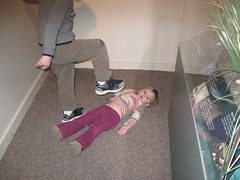Friday, February 12, 2010
The Preventing Harmful Restraint and Seclusion in Schools Act
A 7 year old dies after being held face-down for hours.
A 13 year old hangs himself in a seclusion room.
A 4 year old with cerebral palsy and autism experiences bruising and post traumatic stress disorder after her teachers restrain her in a chair with leather straps.
These are just some of the findings of the United States Government Accountability Office's May 2009 report initiated by the Hon. George Miller, chairman of the Committee on Education and Labor. Chairman Miller is sponsoring the Preventing Harmful Restraint and Seclusion in Schools Act, which is awaiting Congressional approval. Tenets of the Act include permitting restraint or seclusion only under these conditions:
- With appropriate training of staff
- Given parental permission
- Only when injury is imminent (to self, students, or school employees)
- Parent notification must be provided after restraint or seclusion are employed
- Mechanical restraints
- Chemical restraints
- Restraints that restrict breathing.
The Act specifies that restraint and seclusion may not be written into any student's education plan, including behavior plans, individualized education plans (IEP's), and individualized safety plans.
Click here to see an overview of the Act.
The Preventing Harmful Restraint and Seclusion in Schools Act
2010-02-12T17:37:00-05:00
Jennifer Beza Macensky, M.S. Ed.
behavior|legislation|special education|
Subscribe to:
Post Comments (Atom)


























